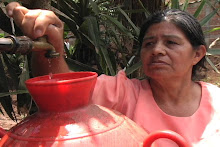By Jason Wallach
El Salvador receives 3 times as much water in rainfall as what its six million inhabitants consume annually, yet 40% of Salvadorans do not enjoy potable water in their homes.
The Salvadoran government and the Inter-American Development Bank (IADB) argue that the problem of water access for Salvadorans can be solved with private sector investment. They attest that only the private sector can provide the capital necessary to repair a multitude of decaying pipes, pumps, and valves—and only companies that are guaranteed a fair measure of return will invest in extending service to meet the needs of El Salvador’s rapidly growing population.
A 1998 loan from the IADB set aside $60 million dollars to help spur on such investment. But a powerful coalition of environmentalists, faith-based activists, consumer advocates and unionists has stalled water reform legislation that would enable companies to profit from water. The coalition argues that allowing private investment in water provision would privatize the country’s water supply, and price water out of reach for the majority of the population who live on less than $2 per day. These self-proclaimed “water warriors” maintain that it is immoral to profit from water while others thirst from an inability to pay exorbitant water prices.
The battle over how to manage El Salvador’s water could reverberate throughout Latin America, where water is becoming ever more scarce. Today’s conflicts over this vital resource could lead to tomorrow’s wars. While the debate over water management rages worldwide, Until the Last Drop examines two opposing visions of water management as they clash in tiny El Salvador.
The film illustrates how regulatory collapse and a legislative stalemate on water reform has real-life impacts for the health and well-being of people who need water to survive.
30.4.09
Subscribe to:
Posts (Atom)
